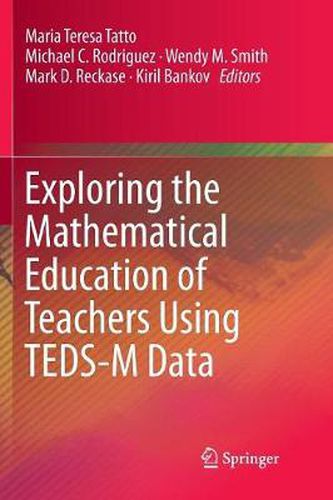Readings Newsletter
Become a Readings Member to make your shopping experience even easier.
Sign in or sign up for free!
You’re not far away from qualifying for FREE standard shipping within Australia
You’ve qualified for FREE standard shipping within Australia
The cart is loading…






This title is printed to order. This book may have been self-published. If so, we cannot guarantee the quality of the content. In the main most books will have gone through the editing process however some may not. We therefore suggest that you be aware of this before ordering this book. If in doubt check either the author or publisher’s details as we are unable to accept any returns unless they are faulty. Please contact us if you have any questions.
This book uses the publicly available TEDS-M data to answer such questions as: How does teacher education contribute to the learning outcomes of future teachers? Are there programs that are more successful than others in helping teachers learn to teach mathematics? How does the local and national policy environment contribute to teacher education outcomes? It invites readers to explore these questions across a large number of international settings.
The importance of preparing future mathematics teachers has become a priority across many nations. Across the globe nations have allocated resources and expertise to this endeavour. Yet in spite of the importance accorded to teacher education not much is known about different approaches to preparing knowledgeable teachers and whether these approaches do in fact achieve their purpose. The Mathematics Teacher Education and Development Study (TEDS-M) is the first, and to date the only, cross-national study using scientific and representative samples to provide empirical data on the knowledge that future mathematics teachers of primary and secondary school acquire in their teacher education programs. The study addresses the central importance of teacher knowledge in learning to teach mathematics by examining variation in the nature and influence of teacher education programs within and across countries.
The study collected data on teacher education programs structure, curriculum and opportunities to learn, on teacher educators’ characteristics and beliefs, and on future mathematics teachers’ individual characteristics, beliefs, and mathematics and pedagogical knowledge across 17 countries providing a unique opportunity to explore enduring questions in the field.
$9.00 standard shipping within Australia
FREE standard shipping within Australia for orders over $100.00
Express & International shipping calculated at checkout
This title is printed to order. This book may have been self-published. If so, we cannot guarantee the quality of the content. In the main most books will have gone through the editing process however some may not. We therefore suggest that you be aware of this before ordering this book. If in doubt check either the author or publisher’s details as we are unable to accept any returns unless they are faulty. Please contact us if you have any questions.
This book uses the publicly available TEDS-M data to answer such questions as: How does teacher education contribute to the learning outcomes of future teachers? Are there programs that are more successful than others in helping teachers learn to teach mathematics? How does the local and national policy environment contribute to teacher education outcomes? It invites readers to explore these questions across a large number of international settings.
The importance of preparing future mathematics teachers has become a priority across many nations. Across the globe nations have allocated resources and expertise to this endeavour. Yet in spite of the importance accorded to teacher education not much is known about different approaches to preparing knowledgeable teachers and whether these approaches do in fact achieve their purpose. The Mathematics Teacher Education and Development Study (TEDS-M) is the first, and to date the only, cross-national study using scientific and representative samples to provide empirical data on the knowledge that future mathematics teachers of primary and secondary school acquire in their teacher education programs. The study addresses the central importance of teacher knowledge in learning to teach mathematics by examining variation in the nature and influence of teacher education programs within and across countries.
The study collected data on teacher education programs structure, curriculum and opportunities to learn, on teacher educators’ characteristics and beliefs, and on future mathematics teachers’ individual characteristics, beliefs, and mathematics and pedagogical knowledge across 17 countries providing a unique opportunity to explore enduring questions in the field.